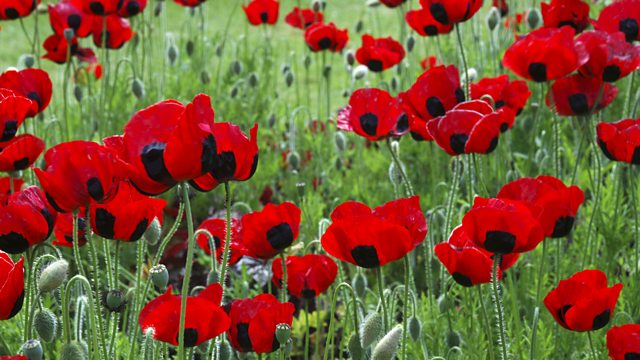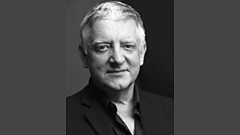
Remembrance
Texts and music remembering those who died in war over the last century, with readers Simon Russell Beale and Hattie Morahan. With Heaney and Brooke, plus Ravel and Barber.
Remembering those who died in war over the last century including poetry by Seamus Heaney, Vera Brittain, Owen Sheers, Rupert Brooke, Michael Longley, Primo Levi and Margaret Postgate Cole and music by Ravel, George Butterworth and Samuel Barber. The readers are Simon Russell Beale and Hattie Morahan.
Producer: Fiona McLean.
Last on
More episodes
Music Played
Timings (where shown) are from the start of the programme in hours and minutes
-
![]() 00:00
00:00Douglas Guest
For the Fallen
Performer: The Choir of Jesus College, Cambridge conducted by Mark Williams.- SIGNUM CLASSICS.
- Tr14.
-
Rupert Brooke
The Soldier read by Simon Russell Beale
![]() 00:02
00:02Ralph Vaughan Williams
Symphony no 3
Performer: Bournemouth Symphony Orchestra conducted by Kees Bakels.- NAXOS.
- Tr2.
Margaret Postgate Cole
The Falling Leaves read by Hattie Morahan
![]() 00:07
00:07Violet Jacob
�Ჹ�����Ƿɱ����
Performer: Sheena Wellington and Karine Polwart.- GREENTRAX.
- Tr11.
Alexander Gillespie
Letter read by Simon Russell Beale
![]() 00:11
00:11Maurice Ravel
Le Tombeau de Couperin Menuet
Performer: Orchestre de Paris conducted by Herbert von Karajan.- EMI.
- Tr9.
Siegfried Sassoon
Aftermath read by Simon Russell Beale
![]() 00:17
00:17Krzysztof Penderecki
Threnody for the Victims of Hiroshima
Orchestra: Polish National Radio Symphony Orchestra. Conductor: Krzysztof Penderecki. Conductor: Krzysztof Penderecki.- EMI.
- Tr2.
Owen Sheers
Mametz Wood read by Simon Russell Beale
![]() 00:22
00:22Eric Bogle
No Mans Land
Performer: June Tabor.- TOPIC.
- Tr11.
Michael Longley
In Memory of Charles Donnelly read by Hattie Morahan
![]() 00:29
00:29Samuel Barber
A Stopwatch and an Ordnance Map
Performer: Cambridge University Chamber Choir conducted by Timothy Brown.- GAMUT CLASSICS.
- Tr6.
Primo Levi translated by
Shema read by Simon Russell Beale
![]() 00:36
00:36Ernest Bloch
Nigun
Performer: Mischa Maisky and Daria Hovora.- DEUTSCHE GRAMMOPHON.
- Tr14.
Anna Akhmatova
From Requiem read by Hattie Morahan
David Grossman translated by Jessica Cohen
from Falling out of Time read by Simon Russell Beale
![]() 00:43
00:43Gideon Klein
Duo for Violin and Violoncello
Performer: Daniel Hope and Philip Dukes.- NIMBUS.
- Tr16.
Seamus Heaney
In a Field read by Simon Russell Beale
![]() 00:47
00:47George Butterworth
Is my team Ploughing?
Performer: Benjamin Luxon.- BELART.
- Tr6.
Paula Meehan
After the News read by Hattie Morahan
![]() 00:52
00:52Gerald Finzi
Farewell to Arms Aria
Performer: Royal Philharmonic Orchestra conducted by Vernon Handley.- LYRITA.
- Tr19.
Ted Hughes
Platform One read by Hattie Morahan
Andrew Motion
The Death of Harry Patch read by Simon Russell Beale
![]() 01:00
01:00Benjamin Britten
War Requiem
Performer: London Symphony Orchestra.- DECCA.
- Tr4.
Vera Brittain
The End read by Hattie Morahan
![]() 01:06
01:06Samuel Barber
Agnus Dei
Performer: The Sixteen conducted by Harry Christophers.- DECCA.
- Tr2.
Producer Note
This week’s Words and Music is Remembrance – the music and poetry of the years leading up to war, the outbreak, displacement and the aftermath of conflict. Although the focus is on the losses suffered in World War One you’ll also hear music and poetry from other wars of the twentieth century.
Remembrance begins with Douglas Guest’s setting of Laurence Binyon’s poem, ‘For the Fallen’, written within a month of the start of World War One, with its familiar words heard every year at the ceremony at the Cenotaph:
‘They shall grow not old, as we that are left grow old:
Age shall not weary them, nor the years condemn.
At the going down of the sun and in the morning
We will remember them’.This is heard alongside ‘The Soldier’, Rupert Brooke’s sonnet written in the voice of a soldier who has died in conflict. At home many female poets wrote of loss. Margaret Postgate Cole’s ‘The Falling Leaves’ reflects on the despair she feels on what she sees as the pointless loss of the ‘gallant multitudes’. The Angus poet Violet Jacob lost her only son Harry during the Battle of the Somme in the summer of 1916. Here, the song setting of ‘Hallowe’en’ tells of a ploughman whose comrade has been lost in the war.
Michael Longley’s poem, ‘In Memory of Charles Donnelly’, remembers the Irish poet who died fighting for the Republicans in the Spanish Civil War. The olive trees under which he lies are echoed in Samuel Barber’s musical setting of Stephen Spender’s poem, ‘A Stopwatch and an Ordnance Map’.
In August 2006 the Israeli writer David Grossman’s son Uri was killed during his national service when his tank was hit by a rocket in southern Lebanon. An extract from Grossman’s extraordinary elegiac book about loss and love, ‘Falling out of time’ is heard with Gideon Klein’s Duo for Violin and Cello.
Written only two months before his death, Seamus Heaney’s ‘In a Field’ was written in response to Edward Thomas’ poem, ‘As the Team’s Head Brass’, composed shortly before Thomas requested a posting to the front where he died in Arras in 1917. Heaney’s poem imagines a farmer in a field, his day’s work done, joined by one who appears in his army uniform to lead him to those who have died in war. You’ll hear it with George Butterworth’s beautiful setting of A.E. Housman’s ‘Is my team ploughing?’ sung by Benjamin Luxon. George Butterworth died in the Battle of the Somme on August 5th 1916.
‘The End’ by Vera Brittain, the writer who lost her brother and her fiancé in the First World War, expresses her hope that they will meet again. The programme ends with ‘Let us sleep now’ from Benjamin Britten’s ‘War Requiem’ and Samuel Barber’s setting of the ‘Agnus Dei’.
Broadcasts
- Sun 9 Nov 2014 17:30����ý Radio 3
- Sun 13 Nov 2016 17:30����ý Radio 3
The hidden history of plant-based diets
Books website
Get closer to books with in-depth articles, quizzes and our picks from radio & TV.
Gallery



